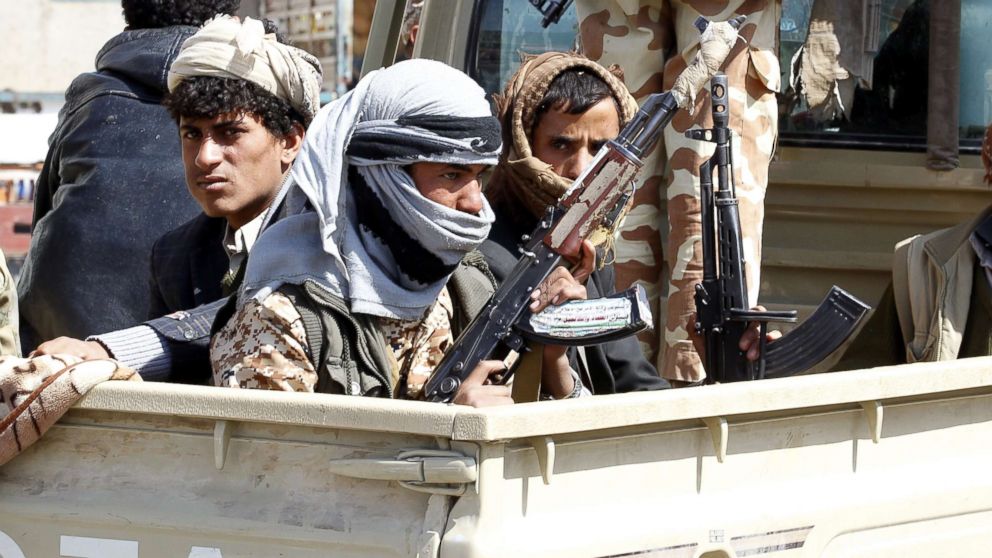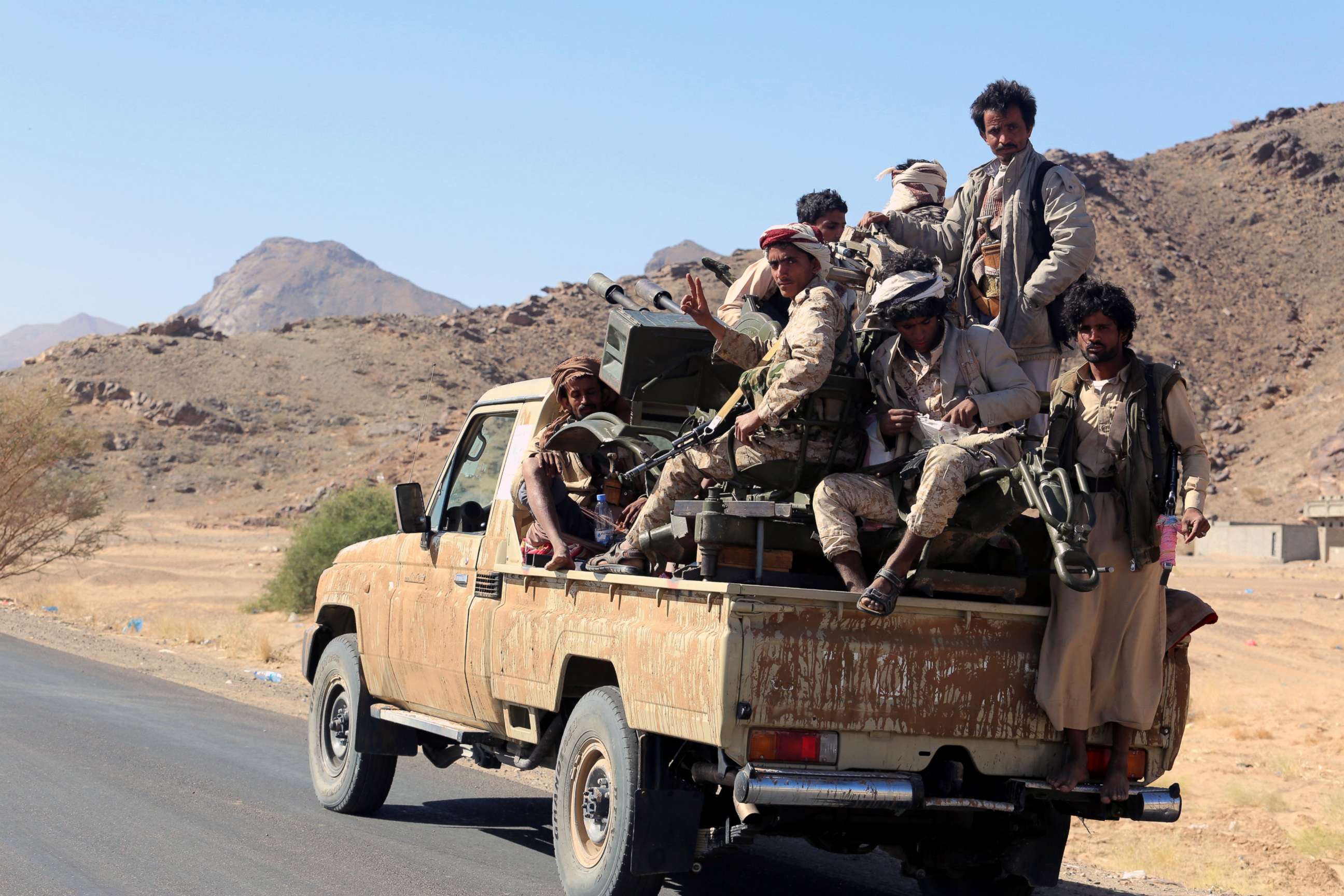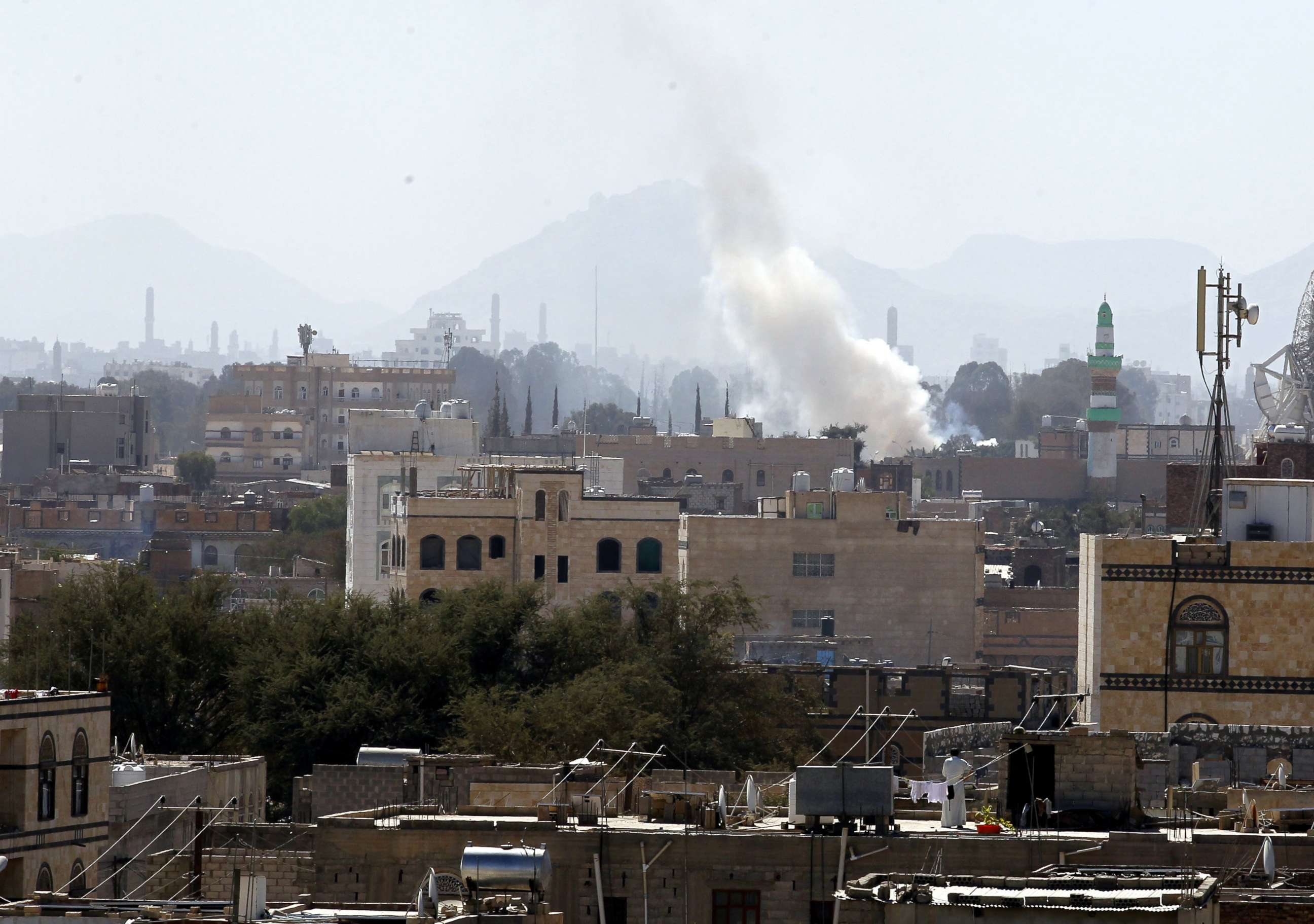Iran-backed Houthis fire another missile at Saudi Arabia, officials say
It's the third missile the Saudis say they have intercepted in two months.

LONDON— -- Yemen's Iran-backed Houthi rebels have fired another ballistic missile into Saudi Arabia, the Saudi government said Tuesday. The missile was successfully intercepted Tuesday by Saudi air defenses south of the Saudi capital of Riyadh, according to the Saudi Ministry of Culture and Information.
"There are no reported casualties at this time," the ministry added.
The ballistic missile targeted the al-Yamamah royal palace in Riyadh, Houthi-affiliated TV al-Masirah said. Unconfirmed videos have emerged on social media showing white smoke in the sky. And a Bloomberg News reporter tweeted that she heard a loud boom in central Riyadh. The palace is the official headquarters of the Saudi king.
Department of Defense spokesman Maj. Adrian Rankine-Galloway said Tuesday morning, "We are working closely with our Saudi partners to fully understand what took place and to ensure that our Saudi partners have the resources they need to defend their territory against indiscriminate attacks against civilian-inhabited areas."
And later in the day, State Department spokeswoman Heather Nauert said, "The United States strongly condemns the reckless Houthi missile attack today on Riyadh. We remain deeply disturbed by aggressive Houthi actions supported by Iran’s provision of advanced weapons, which threaten regional security and prolong the Yemen conflict. The United States calls on Iran’s Islamic Revolutionary Guard Corps to stop arming and enabling the Houthis’ violent actions against Yemen’s neighbors, including Saudi Arabia."
Nauert continued, "A political solution is the only way to advance long-term stability in Yemen and end the suffering of the Yemeni people. We urge all parties to immediately cease hostilities, avoid retaliatory measures and return to political negotiations under the auspices of the United Nations."
This is the third missile the Saudis say they have intercepted in the past two months. Saudi air defenses intercepted missiles fired by the Houthis Dec. 1 and Nov. 4, Saudi state media, SPA, reported.
Tensions between Iran and Saudi Arabia are at some of their highest in recent memory, with escalating rhetorical attacks and proxy military attacks. Saudi accuses Yemen's Iran-backed Houthi rebels of doing Iran's bidding against them, while Iran accuses Saudi of leading a devastating war against Yemen.

The Trump administration has been vocal in its support for Saudi Arabia and has used the latest missile launches to build its case against certifying the Obama-era nuclear deal with Iran.
Tuesday's launch comes days after U.S. Ambassador to the U.N. Nikki Haley held a news conference at a military hangar to show off pieces of Iranian-made Qiam missiles she said were supplied to Houthis.
“In this warehouse is concrete evidence of illegal Iranian weapons proliferation gathered by direct military attacks on our partners in the regime,” she said, standing in front of charred remnants of missiles she said were recovered from Saudi Arabia.
"These are Iranian made, these are Iranian sent, and these were Iranian given," Haley added, describing it as evidence Tehran was violating U.N. resolutions.
One of the exhibits included charred fragments of what the Pentagon said was an Iranian-made, short-range ballistic missile fired from Yemen Nov. 4.

Royal Air Force spokesman Colonel Turki al-Maliki told SPA the Dec. 1 missile was likely headed to the Saudi city of Khamis Mushait but it was successfully intercepted. On Nov. 4, a ballistic missile was launched from across the border toward an area near Riyadh's King Khalid International Airport. At the time, Saudi accused Iran of committing "an act of war."
Maliki said the "control of these types of weapons by terrorist organizations, including Al-Houthi armed militias, represents a threat to regional and international security," according to SPA. He called the launch "contrary to international humanitarian law."
The Saudi Foreign Minister, at the time of the Nov. 4 missile, told CNN "operatives from the Iranian Revolutionary Guards and Hezbollah" smuggled missile parts into Yemen.
"This is a very, very hostile act," Foreign Minister Adel bin Ahmed al-Jubeir told the cable network. "We have been extending our hand to Iran since 1979 in friendship, and what we get back is death and destruction."
In response, Iranian news agency Tasnim reported that Iranian Foreign Ministry spokesman Bahram Qassemi said the Saudi accusations were "false, irresponsible, destructive and provocative."
The New York Times reported last week, defense officials could not say exactly when the weapons were given to the Houthis, which means they could have been transferred prior to U.N. resolution 2231. Passed in 2015, the U.N. resolution bars Iran from moving certain weapons outside the country without permission.
For its part, the Iranian spokesman at the U.N., Alireza Miryousefi, said the evidence Haley presented was fabricated.
“We categorically reject it as unfounded and, at the same time, irresponsible, provocative and destructive," he said. "This purported evidence, put on public display today, is as much fabricated as the one presented on some other occasions earlier.”




